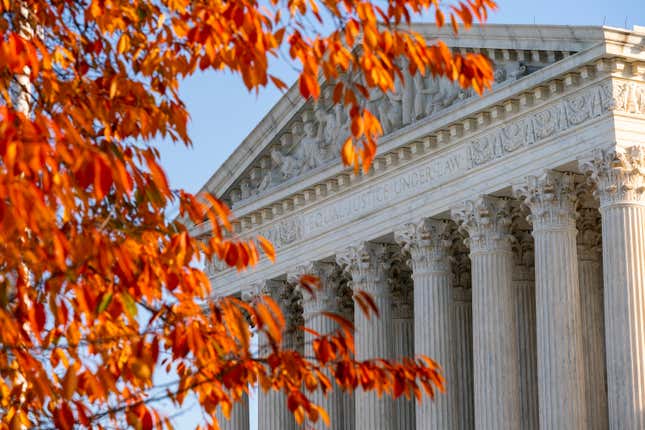
The future of the Affordable Care Act lies once again in the hands of the Supreme Court—this time, during a global pandemic.
The high court will hear arguments today questioning the constitutionality of former President Barack Obama’s signature legislation. This marks the third time the Supremes have been asked to rule on the ACA, also known as Obamacare, since it was passed in March 2010.
As NPR reports, the ACA has prevailed twice at the Supreme Court by margins of 5-to-4 and 6-to-3. This time, however, its future will be decided by a 6-3 conservative majority, and as NPR writes, “most of the groups that fought the ACA after it was enacted in 2010 are missing in action from Tuesday’s case.”
The latest challenge, brought forward by the state of Texas and the Trump administration, hinges on the individual mandate, just as the first challenge—brought to the Supreme Court in 2012—did.
At the time, the individual mandate required people to buy health insurance or pay a penalty. Most of the court’s conservative justices felt this fine surpassed Congress’ power to regulate interstate commerce, but Chief Justice John Roberts sided with the high court’s liberal wing, stating that the penalty essentially acted as a tax. Considered this way, the individual mandate was within bounds of constitutional law, since Congress has taxing power.
A second challenge over a typo brought the legislation before SCOTUS once again, but it was upheld by a 6-3 margin. Then, following Donald Trump’s election in 2017, Congressional Republicans attempted to hack away at the ACA once again. The individual mandate has now been zeroed out, thus raising no revenue. Its challengers this time are arguing that because it can no longer be considered a tax, it is unconstitutional.
A federal appeals court ruled in favor of the law’s challengers last December, finding the individual mandate unconstitutional. But it left open the question of whether the entire act should be tossed out because of the mandate. This is the question that this current set of justices, which includes Trump appointees Neil Gorsuch, Brett Kavanaugh and Amy Coney Barrett, will have to decide: Can the mandate be severed from the law? Or is it so intertwined that the entire act, including its unrelated provisions, must be thrown out?
To put it in the words of Justice Roberts—the Supremes will have to decide whether to take “a scalpel rather than a bulldozer” to cure the law.
The stakes couldn’t be higher for tens of millions of Americans. COVID-19 cases are surging nationwide as states begin preparing for a second, devastating round of the pandemic. Those relying on the ACA could lose coverage overnight, including those who lost employer-subsidized health insurance when they lost their jobs due to the novel coronavirus pandemic this year.
Striking down the ACA would also lift the ban preventing health insurance providers from discriminating against people with preexisting conditions, which would now include COVID-19 as well as cancer, asthma and diabetes. Many of these conditions disproportionately affect Black and other minority communities. Before Obamacare, health insurance companies could deny coverage or hike up prices for those that needed healthcare the most.
As NPR notes, nearly every facet of American’s healthcare industry—from doctors to hospitals to the insurance companies themselves—have urged the Supreme Court to preserve the ACA. Apart from Texas and the Trump administration, several other GOP-led states have joined the challenge against the law.
Legal experts believe that the conservative court will likely decide to keep the ACA at large and sever the individual mandate as it stands. As CNN reports, the situation can also be resolved through Congress if lawmakers can agree on a legislative fix to the bill—either by reducing the penalty to a nominal fee, eliminating the language telling people to buy insurance, or adding a severability clause. Any of these measures, if passed, could kill the legal challenge and preserve the ACA, legal experts say.

